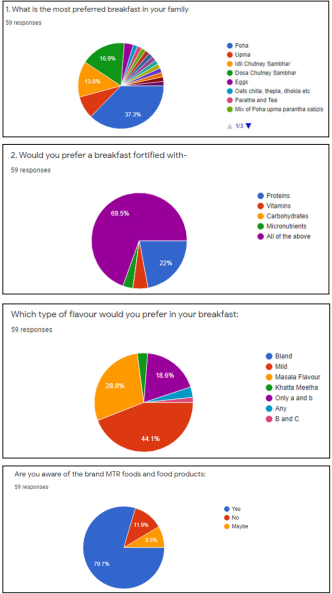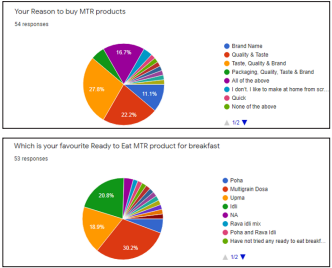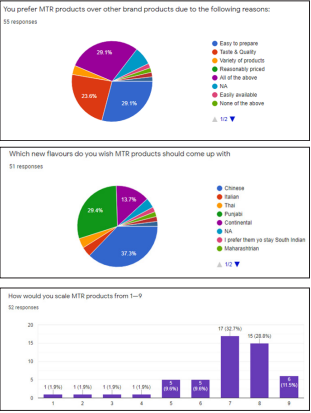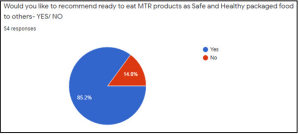Author(s): Jyoti D Vora* and Anuradha Pandey Dubey
Breakfast is the most important meal of the day. The consumption of a good breakfast is considered to kick metabolism and boosts energy levels in the body. In Urban India the socio-cultural situation is in a transit mode where people are not thinking about just having a breakfast but a healthier and well-fortified nutritious breakfast which is preferred. The study of this project is to analyse the type and preferences of breakfast that an Urban Indian family haves owing to the paucity of time, health benefits and many other factors. This study additionally aims at analysing the choices of ready to eat food products over traditional home made food. It highlights the use of branded ready to eat food products like MTR foods, its availability, its marketing standards, public reviews about its variety of food products and some suggestive measures for improving on some of the marketing strategies.
“Eat breakfast like a king, Lunch like a Prince and Dinner like a Pauper” A healthy breakfast replenishes your nutrients to boost your energy levels and alertness which is essential for good health. In India research study reveals that most of them either skips breakfast or have nutritionally inadequate breakfast especially in terms of iron, fibre and other essential nutrients. The urban India is in a transit mode where people have started realizing the importance of not only having breakfast but opting for breakfast fortified with nutrients. Owing to the busy lifestyle and paucity of time the shift from traditional cooking to ready to eat food is increasing in urban areas. This research study aims at highlighting the breakfast types one prefers, the ready to eat brands used by consumers and their reviews on MTR food products available in market.
Rationale of Research
The research study is based on analysing the breakfast habits of
urban Indian subjects. It is found that most of the Indian subjects
are opting for well-fortified nutritious breakfast which is easy
to cook and benefits the health. The importance of health and
wellness factor among the consumers is rising day by day. Owing
to this alarming interest the research aims to identify the breakfast
choices, acceptance of ready to eat food products, its quality and
health benefits, and various marketing strategies that consumer
expects from ready to eat food product brands.
Objective of the Study
The main objective of the research is to study the breakfast
preference in Urban Indian family And find the preference of
ready to eat food products over traditional food prepared at home.
The study further investigates different MTR food products liked
by the Indian consumers and highlight few marketing strategies
that would be consumer friendly and benefit the company brand
for better sustainability.
Research Methodology
The research methodology used in this project is survey based
on online responses and reviews obtained from different families
in India. A Self-administered Questionnaire was prepared and
the Google form was created to avail responses from different
panellists. The Questionnaire comprised of 10 questions based
on the type of breakfast one haves, nutrients expected, flavours,
consumption of ready to eat foods, MTR brand as their choice,
opinions about the brand and improvements expected by the
consumers. The responses of families from different parts of
India and their breakfast preferences were studied in detail. The
questionnaire was designed with a view to find out the most opted
breakfast in India and the awareness of ready to eat food products
that are available in the Indian market. The study focussed on
MTR brand food products and their study on quality, availability,
marketing strategies, packaging and ease of using it.
Analysis of Data Obtained
The responses obtained from different consumers through the
questionnaire was analysed to understand the breakfast pattern
of urban Indian Family and their views on branded ready to eat
food product MTR foods was studied in detail. The graphical representation on the responses received was analysed and it can
be used as a tool for suggestive marketing strategies that needs
to be addressed and require changes in the formulation of food
product as per the need of consumers.




Results and Discussion
The questionnaire based on ready to eat MTR foods and food
product was used as an important tool to survey about the
usefulness of the product, its availability, quality and its preference
in the urban Indian families. The questions were based on the
best preference or choice of breakfast that Indian families prefer,
what types of nutrients they expect in their breakfast, flavour
expectation, novel product design that the consumers expect from
the brand, scaling the brand and the suggestive measures for the benefits of consumers and many more. The graphical data clearly
provides an idea about the product. 59 responses were received
from several states of India on breakfast preference, ready to
eat foods and MTR foods and food product. 37.3% consumers
liked Poha as the best choice for breakfast, 69.5% desire products
with well-balanced nutrients and 44.1 % choose Masala flavour
in the breakfast,79.7% people are aware of ready to eat MTR
foods and food products,27.8% buy it because of taste quality
and brand name,30.2 % consumers totally enjoy the multigrain
Dosa by MTR foods, 29.1 % totally like the brand, its taste and
ease of preparing it, 37.3 % consumers expect the company to
come up with Chinese ready to eat food whereas 29.4% would like
Punjabi flavour food products. The survey also reveals that 32.7%
consumers have scaled the product in the range of 7-(0-9 scale)
and 85.2% would recommend it to others for use. The responses
and reviews also highlighted that the MTR food products are not
easily available in all shops and the panellists recommend that
the company should work on marketing strategies that will make
the product easily available to consumers. Moreover the company
should engage in novel products with different flavours and widen
their ranges of different products [1-8].
Conclusion and Future Objectives
The research study based on survey through self-administered
questionnaire provides valuable data about the breakfast
preferences in urban India. It has also emphasized on the choice
of ready to eat MTR brand food products and its preference over
other food products. The outcome of the survey suggests valuable
inputs that the brand can work upon to sustain at its best in the
market. It is suggestive of improvements in marketing strategies
by making the easy availability of products in every locality and
shops; moreover the consumers expect the brand to come up with
new flavours like Chinese, Thai, Punjabi and masala flavour food
products. Hence the research study was concluded on a scientific
basis and it was a gainful research endeavour.
References
1. Rajmohan PPN (2005) Consumer Preference towards the
Sellers of Ready-made Food Items. South Asian Journal of
Management 12: 475-493.
2. Varuna Rao, Kasturi Sen Ray (2018) Indian Health Food
Consumer: Characteristics and Preferences. International
Journal of Science and Research 1-5-p.
3. Datamonitor (2010) Consumer Trends in India: Opportunities
in Health and Wellness Food & Beverages. Datamonitor.
https://fdocuments.in/document/ consumer-india-healthy-
foods.html
4. Hasnah Hassan S (2011) Consumption of functional food
model for Malay Muslims in Malaysia. Journal of Islamic
Marketing 2: 104-124.
5. Shetty PS (2002) Nutrition transition in India. Public health
nutrition 5(1a): 175-182.
6. Horton (2002) Food habits, food faddism and Nutrition. World
Review of Nutrition and Dietetics 16: 286-316.
7. Popkin BM (1999) Urbanization, lifestyle changes and the
nutrition transition. World development 27: 1905-1916.
8. Lakshmi Shankar Iyer, Nishanth P Kumar (2014) a Study
of Breakfast Habits of Urban Indian Consumers. Research
journals of economics and business study p 1-10.
